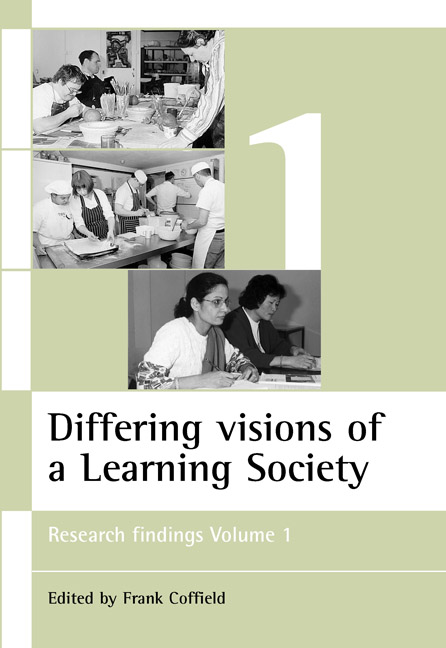Book contents
- Frontmatter
- Contents
- Notes on contributors
- Introduction: A critical analysis of the concept of a learning society
- one ‘Worlds apart’ – Education markets in the post-16 sector of one urban locale 1995-98
- two Unifying academic and vocational learning in England, Wales and Scotland
- three Skill development in higher education and employment
- four The variable contribution of guidance services in different types of learning societies
- five Changing patterns of training provision in the National Health Service: an overview
- six Working and learning in Britain and Germany: findings of a regional study
- seven Development of knowledge and skills at work
- Index
three - Skill development in higher education and employment
Published online by Cambridge University Press: 05 July 2022
- Frontmatter
- Contents
- Notes on contributors
- Introduction: A critical analysis of the concept of a learning society
- one ‘Worlds apart’ – Education markets in the post-16 sector of one urban locale 1995-98
- two Unifying academic and vocational learning in England, Wales and Scotland
- three Skill development in higher education and employment
- four The variable contribution of guidance services in different types of learning societies
- five Changing patterns of training provision in the National Health Service: an overview
- six Working and learning in Britain and Germany: findings of a regional study
- seven Development of knowledge and skills at work
- Index
Summary
Introduction
Higher education has changed radically over the last decade, and is still in the process of change. Some argue that it is in a state of crisis – in terms of funding, quality, the management of academic time and priorities, the conception and management of teaching and learning, and, fundamentally, in terms of purposes. Analysts, such as Barnett (1994) and Scott (1997), conceive the latter as a crisis of knowledge, initiated by the increased role of the state and employers in the determination of the higher education curriculum, and exemplified by the increasing emphasis on so-called transferable skills. The latest major vision statement on higher education supports this shift in purpose, by portraying the new economic order as placing an increasing premium on what it calls ‘key’ skills – seen as necessary outcomes of all higher education programmes (Dearing Report, 1997).
The last decade has seen a shattering of long-held assumptions about university and academic autonomy, as public and political interest in quality, standards and accountability has intensified efforts for reform. These reforms, underpinned by the ideological and philosophical approach of a conservative government and now being pursued by the present government, have had a major impact on higher education institutions. “The search for economy, efficiency and value for money assumes a degree of management totally foreign to the traditional democratic and collegiate culture of the universities” (Green, 1994).
Nevertheless, the Committee of Vice Chancellors and Principals (CVCP) has advocated the inclusion of personal or key skill acquisition in higher education, as illustrated by their joint declaration of intent with the Confederation of British Industry (CBI) and the Council for Industry and Higher Education (CIHE) (1996). In this declaration it was asserted (although it is not clear what evidence has been used to underpin these statements) that most British people, most educators, and most students now believe that it is one of higher education's purposes to prepare students well for working life. A joint national effort was also agreed by the three parties, to ensure that students in higher education develop attributes thought useful for success in employment and future life, that is, the “general personal and intellectual capacities that go beyond those traditionally made explicit within an academic or vocational discipline” (CVCP, CBI, CIHE, 1996).
- Type
- Chapter
- Information
- Differing visions of a Learning Society Vol 1Research Findings, pp. 105 - 138Publisher: Bristol University PressPrint publication year: 2000
- 10
- Cited by

